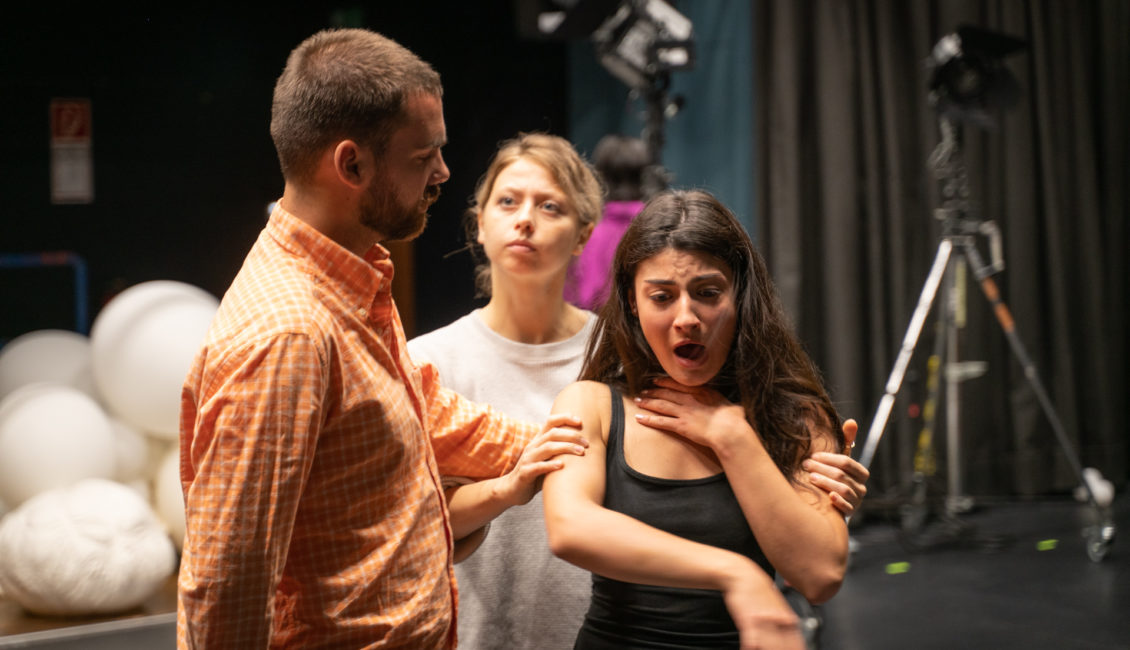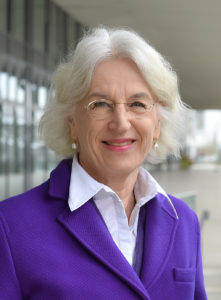
The dancers Alfonso Fernández Sánchez and Sade Mamedova with soprano Ketevan Chuntishvili during rehearsals for RAPE & CULTURE – Photo: Max Ott
“Many more people need to complain”
For RAPE & CULTURE, we sought advice in advance from the Themis trust center. Since 2018, employees have been supporting people from the cultural sector who have experienced sexualized violence. Chairwoman EVA HUBERT talks to us about whether assault is male, which situations are particularly dangerous and what finally needs to be done about abuse of power
Interview:
Cosima Obert
&
Philipp Nowotny
HIDALGO: Ms Hubert, what is sexualized violence?
Eva Hubert:
Sexualized violence can express itself on different levels, verbally and non-verbally. These can be jokes, insinuating remarks and poisonous compliments. This could be porn sent by e-mail or unpleasant staring and whistling. This can range from touching to real physical violence. Basically, I would include everything in the term sexualized violence that is also in the General Equality Act.

Themis Chairwoman Eva Hubert – Photo: Bina Engel
Some people refer to sexualized violence as a certain grey area. When is it still flirting, when is it assault?
This grey area certainly exists, because sexualized violence also has something to do with subjective perception. Some people see something as dirty and offensive that others might find funny. However, studies show that people actually recognize relatively clearly when boundaries are being crossed. People who assault others with unpleasant touches, for example, usually don’t want to notice the other person’s defensive reaction.
In Themis, you deliberately speak of “affected persons” instead of “victims” and of “accused persons” instead of “perpetrators”, why?
These terms put a very strong stamp on the cases. That’s why we set a different framework in which we can clarify with our counselors who is guilty of what and what consequences are needed to resolve this situation.
Why is sexualized violence perpetrated?
In most cases in which the Themis Trust is active, someone wants to exercise power and dominate. So it’s not about wanting to have sexual contact. Rather, the perpetrator of sexual violence wants to show that they are the big shot in the encounter.
In your opinion, does it make sense to look at the motivation of offenders?
Yes, of course. To know where to take countermeasures. Those who have this attitude should also learn to let it go.
Is sexualized violence male?
Yes and no. In over 90 percent of cases, the assault is committed by men, and the majority of them are in a higher position than those affected. But there are also cases in which women have been sexually assaulted. So it would be too easy to say that it is exclusively a male problem. It is a power problem.
What does an assault do to those affected?
That depends on how well the person concerned can defend themselves. Sometimes a “Come on, give me a break” is enough to clarify the situation. However, we see time and again that assaults are constantly going on in the minds of those affected, that they feel insecure, that their self-confidence is damaged.
In what situation do those affected turn to Themis?
Some people just want to find out for themselves whether what they have experienced falls into the category of sexual harassment. But then there are also cases where people are traumatized, have been unable to sleep for months and are then advised by us to contact a psychosocial counselling centre. In most cases, those affected wish to remain anonymous.
This shows how great the fear is.
Sure, that’s the most regrettable thing about it. Nobody wants to be labeled as someone who always complains so much.
You say that sexualized violence is a structural problem in the cultural sector.
Because we have many fragile employment relationships, often do many jobs one after the other, you have to reapply again and again. Often only one or very few people decide whether I get ahead professionally or not.
Are there typical relationship constellations that are susceptible to sexualized violence?
Yes, in film it’s the relationship between a young actress and an artistic director, director or production manager. One person has the power to award a job and demands favors in return.
How widespread is this behavior?
No studies are available on this. There is a survey of Swiss theaters in which 80 percent of women said they had been sexually harassed in recent years. Basically, we observe that as soon as a case of sexualized violence becomes public in one area, more and more victims from this area contact us, so the number of unreported cases is high.
There is also talk of the “wall of silence”, meaning that everyone knows something is wrong, but nobody does anything.
This is particularly clear in the case of director Dieter Wedel. I keep hearing “My God, everyone knew that”. Whereby the knowledge seems to be distributed. Some say they knew he bullied people, humiliated them and shouted them down in front of the whole team on set. Most of the people who worked for him keep quiet about the fact that he always picked out women he wanted to go to bed with. If I, as a production manager or costume designer, find out about something, I’m naturally afraid to say something because then I might lose my job.
What specifically needs to be done to better tackle the structural problem of sexualized violence?
I wish that many more people would complain when they are harassed, that this would be taken for granted. On the other hand, employers must deal better with such complaints, they must not have negative consequences for the complainants.
How do we get there?
By talking about it a lot. Any attention to the topic is important, which is why I also find
their production
good. More needs to happen overall. We have to start with young people and, for example, educate them at music academies about what situations can arise, how to behave and where to turn.
—
If you are acutely affected by violence, please contact a contact point. Possible points of contact:
Available nationwide, around the clock:
–
Violence against women helpline
: 08000 116 016
–
Telephone counseling
0800 11 10 111 or 0800 11 10 222
Regional in Munich:
–
Crisis service Bavaria
: 0180 655 3000
–
Women’s helpline Munich
(Mon-Fri 10 am – 1 pm and 3 pm – 2 pm, except Wednesday: 10 am – 1 pm and 6 pm – 2 pm): 089 76 37 37
–
Wildwasser München e.V.
(Mon 10am-12pm, Wed 4pm-6pm, Thurs 2pm-4pm): 089-600 39 331
Themis Confidence Center against sexual harassment and violence
in the film, television and theater industry (Mon 10am-12pm, Wed & Thurs 10am-12pm and 3pm-5pm): 030/23 63 20 20
